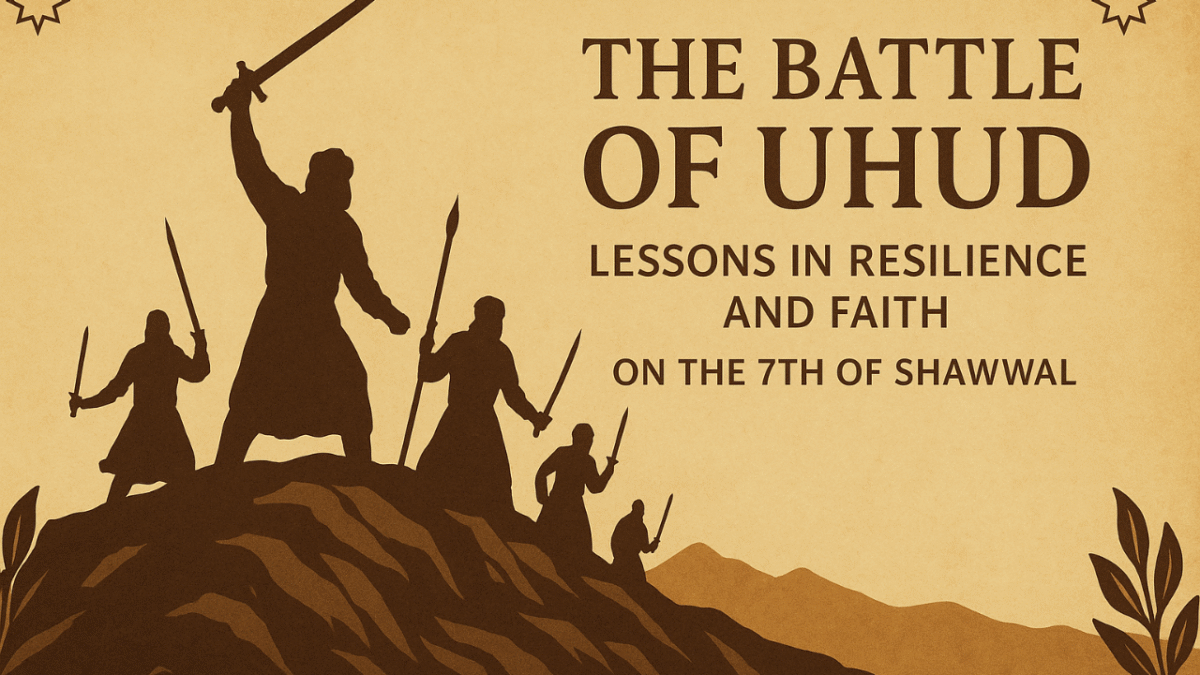The Battle of Uhud: Lessons in Resilience and Faith on the 7th of Shawwal
Introduction
The Battle of Uhud, a pivotal event in Islamic history, took place on the 7th of Shawwal in the year 3 AH (After Hijra). This battle, fought between the early Muslim community led by the Prophet Muhammad (peace be upon him) and the Quraysh of Makkah, offers profound lessons in resilience, faith, and the consequences of human actions. In this blog post, we will delve into the historical context, key events of the Battle of Uhud, its significance, and the enduring lessons it imparts.Historical Context
The Battle of Uhud occurred in the aftermath of the Battle of Badr, a significant victory for the Muslim community. The Quraysh of Makkah sought revenge, and hostilities escalated. The battle unfolded in the valley of Uhud, located near the city of Madinah.Key Events of the Battle of Uhud
- Initial Success:At the outset of the battle, the Muslims enjoyed initial success and maintained their strategic position on the slopes of Mount Uhud. The Prophet Muhammad (PBUH) placed a group of archers on a nearby hill to protect the Muslim rear.
- Disobedience of Orders:Despite clear instructions from the Prophet (PBUH) not to abandon their positions on the hill, a group of archers descended to collect the spoils of war prematurely. This disobedience created an opening for the Quraysh cavalry to attack from the rear.
- Chaos and Casualties:The unexpected attack from the rear led to chaos within the Muslim ranks. Many Muslims were martyred, including Hamza ibn Abdul-Muttalib (RA), the beloved uncle of the Prophet (PBUH), and other prominent companions.
- Strategic Withdrawal:Realizing the unfavorable turn of events, the Prophet (PBUH) ordered a strategic withdrawal to the slopes of Mount Uhud, ultimately preventing a total defeat.
Significance of the Battle of Uhud
The Battle of Uhud holds profound significance and offers several enduring lessons:- Resilience in the Face of Adversity:The Muslims faced significant challenges during the battle, yet their resilience and determination to stand their ground exemplify the strength of faith and the importance of steadfastness in adversity.
- Consequences of Disobedience:The disobedience of a group of archers to the Prophet’s (PBUH) orders had dire consequences. It serves as a stark reminder of the importance of following leadership and adhering to clear instructions in any endeavor.
- Tests of Faith:The Battle of Uhud tested the faith and commitment of the early Muslim community. It highlighted the need for unity, discipline, and trust in Allah’s plan even in difficult circumstances.
- Leadership and Strategy:The leadership of the Prophet Muhammad (PBUH) and his strategic decisions during the battle showcase the importance of effective leadership in times of crisis.
- Compassion and Martyrdom:The loss of beloved companions, such as Hamza (RA), underscores the concept of martyrdom and the sacrifices made for the sake of Islam.
Enduring Lessons from the Battle of Uhud
The Battle of Uhud imparts several enduring lessons for Muslims and humanity as a whole:- Faith and Perseverance:The battle teaches the importance of unwavering faith and perseverance in the face of adversity. Muslims are reminded that trials and tribulations are part of life’s journey.
- Unity and Obedience:The battle underscores the significance of unity among Muslims and the importance of obeying legitimate leadership and adhering to principles and instructions.
- Leadership and Strategy:Effective leadership and strategic planning are essential in both military and non-military endeavors. The Prophet Muhammad’s (PBUH) leadership serves as a model for guidance.
- Compassion and Sacrifice:The battle highlights the sacrifices made by early Muslims for the sake of their faith. It encourages empathy and compassion for those who endure hardships.
- Learning from Mistakes:The consequences of disobedience at Uhud emphasize the need to learn from mistakes and make better decisions in the future.
Conclusion
The Battle of Uhud is a testament to the resilience, faith, and sacrifices of the early Muslim community. It reminds Muslims of the challenges they may face on their journey of faith and the importance of steadfastness in the face of adversity. Furthermore, the battle serves as a source of inspiration for effective leadership, strategic planning, unity, and the consequences of disobedience. As Muslims commemorate the 7th of Shawwal, they reflect on the enduring lessons from Uhud, seeking to apply them to their lives and the challenges they encounter on their path of faith.عنوان: جنگ احد: استقامت اور ایمان کا سبق 7 شوال
تعارف
جنگ احد، اسلامی تاریخ کا ایک اہم واقعہ، 7 شوال 3 ہجری ( ہجری کے بعد) کو پیش آیا۔ یہ جنگ، ابتدائی مسلم کمیونٹی جس کی قیادت نبی اکرم صلی اللہ علیہ وسلم نے کی اور مکہ کے قریش کے درمیان لڑی گئی، لچک، ایمان اور انسانی اعمال کے نتائج کے بارے میں گہرا سبق دیتی ہے۔ اس بلاگ پوسٹ میں، ہم تاریخی سیاق و سباق، جنگ احد کے اہم واقعات، اس کی اہمیت، اور اس سے ملنے والے پائیدار اسباق کا جائزہ لیں گے۔
تاریخی سیاق و سباق
جنگ احد جنگ بدر کے بعد ہوئی جو کہ مسلمانوں کی ایک اہم فتح تھی۔ مکہ کے قریش نے بدلہ لینے کی کوشش کی، اور دشمنی بڑھ گئی۔ یہ جنگ احد کی وادی میں ہوئی جو مدینہ منورہ کے قریب واقع ہے۔
جنگ احد کے اہم واقعات
ابتدائی کامیابی: جنگ کے آغاز میں مسلمانوں نے ابتدائی کامیابی حاصل کی اور کوہ احد کی ڈھلوان پر اپنی سٹریٹجک پوزیشن برقرار رکھی۔ نبی اکرم صلی اللہ علیہ وسلم نے تیر اندازوں کے ایک گروہ کو مسلمانوں کے عقب کی حفاظت کے لیے قریبی پہاڑی پر رکھا۔
حکم کی نافرمانی: نبی اکرم صلی اللہ علیہ وسلم کی طرف سے پہاڑی پر اپنی جگہوں سے دستبردار نہ ہونے کی واضح ہدایات کے باوجود، تیر اندازوں کا ایک گروہ قبل از وقت جنگ کا مال غنیمت جمع کرنے کے لیے اترا۔ اس نافرمانی نے قریش کے گھڑ سواروں کے لیے پیچھے سے حملہ کرنے کا راستہ پیدا کر دیا۔
افراتفری اور ہلاکتیں: پیچھے سے غیر متوقع حملے نے مسلمانوں کی صفوں میں افراتفری مچادی۔ بہت سے مسلمان شہید ہوئے جن میں رسول اللہ صلی اللہ علیہ وسلم کے پیارے چچا حمزہ بن عبدالمطلب رضی اللہ عنہ اور دیگر ممتاز صحابہ شامل تھے۔
تزویراتی انخلا: واقعات کے ناموافق موڑ کو محسوس کرتے ہوئے، نبی اکرم صلی اللہ علیہ وسلم نے کوہ احد کی ڈھلوانوں کی طرف حکمت عملی سے دستبرداری کا حکم دیا، بالآخر مکمل شکست کو روک دیا۔
جنگ احد کی اہمیت
احد کی جنگ بہت زیادہ اہمیت کی حامل ہے اور کئی پائیدار اسباق پیش کرتی ہے:
مصیبت کے وقت استقامت: مسلمانوں کو جنگ کے دوران اہم چیلنجوں کا سامنا کرنا پڑا، پھر بھی ان کی استقامت اور اپنی جگہ کھڑے ہونے کا عزم ایمان کی مضبوطی اور مصیبت میں ثابت قدمی کی اہمیت کی مثال ہے۔
نافرمانی کے نتائج: تیر اندازوں کے ایک گروہ کی رسول اللہ صلی اللہ علیہ وسلم کے حکم کی نافرمانی کے سنگین نتائج برآمد ہوئے۔ یہ قیادت کی پیروی اور کسی بھی کوشش میں واضح ہدایات پر عمل کرنے کی اہمیت کی واضح یاد دہانی کے طور پر کام کرتا ہے۔
ایمان کے امتحانات: جنگ احد نے ابتدائی مسلم کمیونٹی کے ایمان اور عزم کا امتحان لیا۔ اس نے مشکل حالات میں بھی اتحاد، نظم و ضبط اور اللہ کے منصوبے پر بھروسہ کرنے کی ضرورت کو اجاگر کیا۔
قیادت اور حکمت عملی: پیغمبر اسلام (ص) کی قیادت اور جنگ کے دوران ان کے حکمت عملی کے فیصلے بحران کے وقت موثر قیادت کی اہمیت کو ظاہر کرتے ہیں۔
ہمدردی اور شہادت: حمزہ رضی اللہ عنہ جیسے پیارے صحابی کا کھو جانا شہادت کے تصور اور اسلام کی خاطر دی گئی قربانیوں کو واضح کرتا ہے۔
جنگ احد سے سبق آموز سبق
احد کی جنگ مسلمانوں اور مجموعی طور پر انسانیت کے لیے کئی پائیدار اسباق دیتی ہے:
ایمان اور استقامت: یہ جنگ مصیبت کے وقت اٹل ایمان اور ثابت قدمی کی اہمیت سکھاتی ہے۔ مسلمانوں کو یاد دلایا جاتا ہے کہ آزمائشیں اور فتنے زندگی کے سفر کا حصہ ہیں۔
اتحاد اور اطاعت: یہ جنگ مسلمانوں کے درمیان اتحاد کی اہمیت اور جائز قیادت کی اطاعت اور اصولوں اور ہدایات پر عمل کرنے کی اہمیت کو واضح کرتی ہے۔
قیادت اور حکمت عملی: فوجی اور غیر فوجی دونوں کوششوں میں موثر قیادت اور تزویراتی منصوبہ بندی ضروری ہے۔ پیغمبر اسلام (ص) کی قیادت رہنمائی کے لیے نمونہ ہے۔
ہمدردی اور قربانی: یہ جنگ ابتدائی مسلمانوں کی طرف سے اپنے عقیدے کی خاطر دی گئی قربانیوں کو اجاگر کرتی ہے۔ یہ ان لوگوں کے لیے ہمدردی اور ہمدردی کی حوصلہ افزائی کرتا ہے جو مشکلات برداشت کرتے ہیں۔
غلطیوں سے سیکھنا: احد میں نافرمانی کے نتائج غلطیوں سے سیکھنے اور مستقبل میں بہتر فیصلے کرنے کی ضرورت پر زور دیتے ہیں۔
نتیجہ
احد کی جنگ ابتدائی مسلم کمیونٹی کی لچک، ایمان اور قربانیوں کا ثبوت ہے۔ یہ مسلمانوں کو ان چیلنجوں کی یاد دلاتا ہے جن کا انہیں اپنے ایمان کے سفر میں سامنا کرنا پڑ سکتا ہے اور مشکلات میں ثابت قدمی کی اہمیت۔ مزید برآں، جنگ موثر قیادت، حکمت عملی کی منصوبہ بندی، اتحاد اور نافرمانی کے نتائج کے لیے تحریک کا ذریعہ ہے۔ جیسا کہ مسلمان 7 شوال کی یاد مناتے ہیں، وہ احد کے پائیدار اسباق پر غور کرتے ہیں، ان کو اپنی زندگیوں میں لاگو کرنے کی کوشش کرتے ہیں اور اپنے ایمان کی راہ میں درپیش چیلنجوں کا سامنا کرتے ہیں۔




English Maariful Quran Volume 4 by Mufti Muhammad Shafi Usmani (R.A.) – English Translation and Tafseer Book Cover
English Maariful Quran Volume 4 – Tafseer by Mufti Muhammad Shafi Usmani (R.A.)
Read more